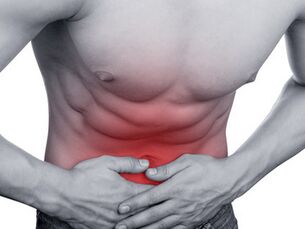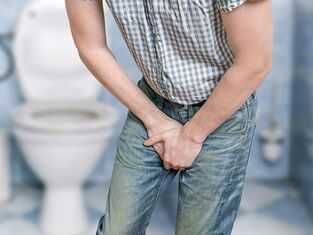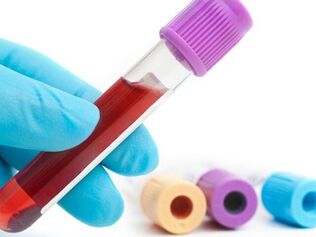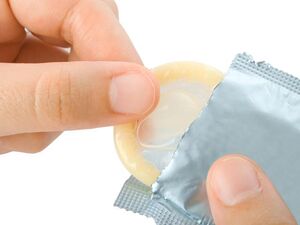Prostatitis refers to a complete male pathology of the reproductive and urinary system. The disease can be acute or chronic, manifesting differently in each patient. Today it is a common disease of the genitourinary system. Currently, the disease has much rejuvenated and appeared in men over 25 years old. In this article, we will look at the question of how prostatitis is manifested and how to treat it.

Required Information
The nature of prostate dysfunction depends on a certain stage of sexual development in men:
- Adolescent male prostate damage is possible. However, such a disease is not considered a separate disease because the gland is underdeveloped;
- men who have a rough sex life are more likely to develop prostatitis in the form of an acute inflammatory process; Prostate disease
- in adult men manifests as one of three diseases: benign and malignant tumor, chronic prostatitis.
People who have undergone any form of genital mutilation do not have a prostate function.
The prostate gland is an accessory gland in the strong half. It is located at the junction of the urinary tract and the ejaculation tunnel. The importance of the prostate gland in pre-pubertal adolescent men has been defied by the study. In adults, the prostate gland is responsible for:
- the formation of secretions makes semen less viscous and allows sperm to survive on its way to the egg;
- forms prostaglandins in the body. This is a component responsible for increasing blood flow to the genitals before an erection forms. It also promotes the production of the hormone testosterone;
- is responsible for the high rate of semen release during ejaculation, and is also involved in the occurrence of the last moment of intercourse associated with the climax of intimate pleasure;
- with the help of the reflex does not allow the penetration of urine into the semen during intimate sex.
The prostate gland is poorly protected against pathogenic bacteria. It directly depends on the pathological state of the pelvic organs. A large amount of blood and lymph moves through the damaged prostate vessels, resulting in stasis and edema, which in turn aggravates inflammation. The gland contains a large number of nerve fibers, so the pathology is manifested by pain.

Prostatitis is an inflammatory lesion in the prostate gland. The most common cause of this disease is a pelvic infection. But the trapped infection itself is incapable of causing inflammation; This requires the presence of pathogenic factors. This category includes:
- lifestyle measurements (sedentary people are at risk);
- keeps stools regularly;
- greatly hypothermia;
- is overly intimate and abstained for a long time;
The prostate gland is small in size and weighs about 20-25 grams. But the bile of the gland is capable of destroying bacteria, so inflammation in the prostate occurs during stagnation, after which the bile loses its lethality.
Manifestations of prostatitis
There are two stages of the disease:
The acute form is manifested by the most intense inflammation of the prostate gland. Patient has fever up to 39 degrees, pain in the groin area and in the process of eliminating feces, urine. These are the first characteristic symptoms of prostatitis.
During the chronic period these symptoms subside, so many men do not pay attention to the characteristic manifestations of the disease. The patient may experience a temperature rise of up to 37 degrees, painful feelings of defecation and defecation. However, the main symptom of chronic prostatitis is the secretion of a small amount of mucus or pus from the urethra.
Factors leading to trends
There are the first 6 symptoms of prostatitis - this is a failure in drainage due to the complicated amount of urine from the bladder when the urethra is squeezed by an enlarged prostate gland (difficult syndromePrimary):
- droop excretion of urine;
- painful feeling;
- urine stream without pressure and not exceeding 20 cm;
- jet interrupt;
- regularly degasses at night;
- feeling your bladder is not completely empty.
Important! Prostatitis cannot be diagnosed by detecting these symptoms without careful examination. This disease has a very complex onset and development process, including many different mechanisms.
Do not treat the disease based solely on clinical manifestations. Specialist should be contacted immediately for an accurate diagnosis and treatment of indications. Diagnosis and treatment are prescribed taking into account the organs and systems affected by the disease. In some cases, you need to consult other specialists.
Symptoms
Prostatitis can manifest in an acute form of an inflammatory and chronic process. The acute course is characterized by inflammation of the mucous membranes, cysts and parenchyma, but they should not be confused with symptoms of prostate adenoma. And chronic - manifested by concomitant diseases.
Symptoms of prostatitis in men, detected by clinical and functional examination:
- Urinate often
A normal man may have deurine requirements up to 12 times a day, usually 5 times. The urine volume of a healthy patient per day is from 1 to 2 liters. The desire to relax in a healthy man arises when the bladder is filled with a volume of 120-170 ml. A accumulation of urine in excess of 350 ml produces the strongest urge to urinate.

During the inflammatory process, the walls of the bladder are systematically irritated and the gas release becomes:
- is not rare, while urine output is within the normal range;
- in small amounts: the products of the inflammatory process irritate the receptors of the bladder, and there is a false desire for gas, feeling the bladder is full, after all the water is gonefeeling of fullness;
- painful due to a narrow urethra;
- difficulty due to the compression of the gland in the urethra, sometimes manifested by the inability to empty the bladder when it is too stretched;
- often at night;
- temperature.
Normally, the temperature increases from 37 to 38 degrees. In the early stages of sepsis with purulent gland inflammation, the temperature rises above 39 degrees. At the end of septic shock, the temperature, on the contrary, drops to 35 degrees. Low temperature is life-threatening due to disorders of platelet clotting process. The outcome of prostatitis with septic complications is unfavorable.
- There is blood in the urine
This is quite rare, but it is a dangerous sign of the course of the disease. Continuous bleeding is almost impossible to stop. There are several reasons for hematuria:
- has a perforation in the urethra;
- trauma during the study;
- malignant hyperplasia;
- soreness.
Complicated prostatitis accompanied by constant pain. It may rarely be intermittent. Usually, the pain is dull or achy and manifests itself in the perineum and anus.
Laboratory method
Specified to clarify the stage of the disease:
- Blood test. With the prostate gland, an increased content of leukocytes is detected, the rate of erythrocyte sedimentation increases and a change in the leukocyte formula for stab cells;
- Urine analysis. Determination of the purulent composition of the urine and the presence of bacteria. A study of 3 vials was used: 3 parts of urine were collected at the beginning, middle and end of the sterilization process. Many studies of urine over a period of several days show changes in the microbiota;
- Bacterial blood cultures. It is prescribed to develop blood intoxication with a daily temperature fluctuation of 3-5 degrees.

Research tool
- Ultrasound of the rectum. To clarify the diagnosis is the most informative method. This study has contraindications.
- X-ray method Before the test, a contrast agent is injected into the bladder.
- Amputation of a portion of tissue for microscopic examination is used for limited indications.
The reason for prostatitis
Experts define several classifications on why a man can get prostatitis:
- complications of symptoms of any disease that have previously affected a person or the negative effects of gynecological diseases in a sexual partner; Urethral reflex
- . Prostate dysfunction leads to an inability to stop the flow of urine. When this fluid reaches the genital tract, it is called the urethral reflex. Then, the bacterial germ of the gland is formed. It is the result of an infection in the urethra or improper catheterization. There is also an enlargement of the lumen of the urethra;
- an unusually intimate way of life. If a man significantly increases or decreases the number of times he has sex, this can contribute to the development of prostatitis. Delayed ejaculation is also cause for concern;
- node of venous blood in the genitals in the pelvic region. This happens in the absence of an adequate amount of physical activity or sport;
- hormonal disorders caused by the production of less hormones formed in the gonads. Due to this pathology, joint discomfort of skeletal muscle and smooth muscle as well as other diseases occurs.

Types of prostatitis
There are two parts of this disease: bacteria and not bacteria.
The first type is characterized by the fact that the disease arises due to the presence of pathogenic bacteria that have entered the body from the outside environment. Staphylococci, streptococci, Escherichia coli and many others belong to the group of harmful microorganisms. In addition, this class of prostatitis includes cases caused by a sexually transmitted disease.
For the second, non-bacterial species, there are also some divisions:
- Congestive prostatitis. In this case, inflammation of the gland is caused by pelvic congestion. This result is often due to incomplete ejaculation, excessive intimate behaviors, long abstinence and inadequate intercourse.
- Sclerosing prostatitis. It is characterized by a decrease in the size and function of the prostate gland. The tissue thickens as prostate cells die and their degeneration into hard connective tissue. The reasons for this type are frequent bowel disorders in the form of difficulty, slow bowel movements, certain medications and many infections. This type of prostatitis cannot be cured.
- Calculated prostatitis. With this type of inflammation, the presence of stones in the gland is revealed. When they reach large sizes, they cause intense pain in the urethra. Therapy includes removing a stone either surgically or with treatment.
- Prostate depression. It is characterized by the presence of constant pain in the pelvic region, its causes have not been studied. It can be due to backflow, bladder neck disease, muscle tissue damage between the anus and genitals, in addition it may be due to psychological factors.
- Atypical prostatitis. Patients may complain of soreness in the lower extremities, lumbar and sacrum, which is absent in typical forms of prostatitis. The outcome of therapy is directly related to the duration of the disease, the presence of complications and the severity of the inflammatory process.

If treatment is started at the wrong time, or the exacerbation of repeated prostatitis, the inflammation becomes severe and has many serious complications: decreased fertility, inability to conceive, depression, severe pain, prostate adenoma in men.
Complications
Everything will depend directly on your age, immunity, bad habits, and length of treatment. Therefore, in the elderly with a complicated, weakened immune system when consuming too much alcohol-containing products, the consequences will be severe.
Actions according to effect. Damaged glands decrease the production of hormones that cause an erection. Complications include a lack of fullness in close proximity, weak semen drainage, signs of a prostate adenoma in men, and impotence.
Affects the conception of a child. An inflamed prostate significantly reduces the production of normal secretions needed by sperm in the female reproductive organs for fertilization. The secret, entering the girl's reproductive canal with intimacy, is exposed to immune rejection, which leads to the inability of the egg to fertilize.
Other complications. With exacerbation of prostatitis, the risk of pus accumulation in the tissues of the gland increases. Pain when prostatitis increases. With a secondary infection, the epithelium melts, followed by the appearance of a proximal cyst. In addition, the consequences include a form of urinary retention, urolithiasis, prostate adenoma development in men and others.
Intimately with inflammation
It has been proven that the main cause of prostatitis is lack of sex with increased stimulation or excessive sexual activity. Regular ejaculation with a normal frequency has a beneficial effect in the early stages of prostatitis. In some processes and stages of the disease, intimate relations are temporarily prohibited. More detailed information can be consulted with a specialist.
Important! During the treatment of prostatitis, you can have sex but only need to have safe, moderate sex, unless your doctor has instructed otherwise.
Prostatitis is a complete disease of men. But gland inflammation is dangerous to the health of the partner. It threatens conception and pregnancy of a child. A healthy lifestyle and reliable birth control are an effective way to protect your partner from complications.

Treatment of prostatitis
Just timely referral to the specialist can completely cure and prevent further development of the disease. In this case, you will achieve a positive result. When irreversible changes appear, a complete cure is not possible. As a rule, repeated inflammation occurs with a transition to the chronic type.
Along with drug therapy, it is important that the patient is willing to make lifestyle changes (eg, infrequent intimacy or sedentary lifestyles). If the patient does not want to change his usual lifestyle, the disease will soon return on its own. It is precisely because of the fact that patients do not want to change these negative factors, and the connected notion that prostatitis cannot be treated.
Treatment plan, period of time will be specified by the specialist after a full examination and determination of the cause of occurrence. The main drug used in the course of treatment is antibiotics. Also should take vitamins, physical therapy, take pain relievers and anti-inflammatory drugs. Exacerbations of prostatitis require a longer treatment period.
Diet
With the right diet and the use of several foods, you can achieve:
- pain relief;
- improves the movement of blood and lymph in the vessels of the prostate gland;
- strengthens the immune system;
- normalizes intestinal function;
- reduces nighttime urine production.
The following foods should be excluded from the diet:
- Coffee and spicy foods - increase blood flow to the prostate gland, increasing soreness.
- Fat, fatty meats, eggs, flour products - increases the formation of cholesterol plaques on the walls of blood vessels, reducing blood flow.
- Alcoholic products - reduces the body's immune system.
- Foods with crude fiber and salt - violation of the contraction of the intestinal wall.
- Drinking too much fluids (especially in the evening) - increases the amount of fluid in the body, leading to puffiness.
Recommended foods: fresh vegetable salad with olive oil, fruits, boiled lean meats, vegetables, juices and nuts.

Precautions
Recommended:
- wide-footed walking (physiological walking);
- reasonable nutrition;
- healthy lifestyle;
- uses a male contraceptive;
- moderate level of intimacy and more.
Conclusion
You don't have to wait for any illness to show up, but you do need to see your doctor once a year as a precaution. Treatment of secondary exacerbations of prostatitis is much more difficult and takes longer, and is fraught with its own complications.
In this article, we have explored the manifestations of prostatitis and the pain of prostatitis, how to treat this disease.


























